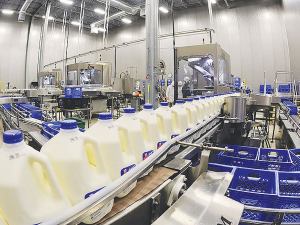M.I.A.
OPINION: The previous government spent too much during the Covid-19 pandemic, despite warnings from officials, according to a briefing released by the Treasury.
 The dairy processing industry is facing the prospect of losing some highly skilled staff because they are not fully vaccinated.
The dairy processing industry is facing the prospect of losing some highly skilled staff because they are not fully vaccinated.
The dairy industry is facing the prospect of losing some highly skilled staff because they are not fully vaccinated.
Chris Flatt, national secretary of the dairy worker union, told Rural News that he fears some workers may be lost to the industry because of their anti-vaccination stance.
He believes that some tough conversation will need to be had.
The union represents 8,500 workers in the industry and Flatt says the key focus for the union is about people's health and safety when they go to work. He says, like the rest of society, there are conflicting views within the dairy industry workforce on the issues of vaccination.
Dairy companies around the country are individually going through a risk assessment process and consulting staff on whether or not to mandate vaccinations for staff.
"What we have heard is that the majority of our members support vaccination," he told Rural News. "They want to be safe at work and have received double vaccination. But there are those within our union, like in wider society, who don't agree with that and we are trying to support them as well."
Flatt says his union has been heavily involved in the consultation processes on risk assessments with the dairy companies that they have collective agreements with. He says the process has been fair and they feel their concerns have been listened to.
Flatt notes that while they may not agree with everything, the union accepts the fact that companies have the right in law to put in place vaccination mandates for their staff.
The union has the challenging task of supporting both those who are vaccinated and those who are not. In the case of the latter, Flatt says they are working with these people to see if they can get a vaccination or possibly an exemption, which some companies are offering in certain circumstances - particularly on medical grounds.
"But we also have members who tell us they want to turn up to work and be safe at work and not be around potentially those that could spread the virus."
Dealing With Covid
Chris Flatt says part of ongoing discussions between the union and dairy companies relates to sick leave and how people can isolate if they get sick.
He notes that there are multi-generational households in rural areas and this presents its own challenges.
"The Government has talked about some support around this as well, but we need to ensure workers can isolate and be off work and not feel pressured to go back to work early," he explains. "A lot of our collectives have good sick leave provisions. From what we have seen overseas, we need to prepare for huge amounts of sick leave to be taken."
At the same time, Flatt says they have to look after staff who may have to fill in for those who are sick and ensure that they are not doing too much, and that their collective employment agreement terms are complied with.
"But at the same time, recognising there may need to be some flexibility on certain sites because we could have large numbers of workers just being on sick leave," he adds.
One of the worries for the dairy industry, Flatt says, is how to replace workers who have to exit the industry because of vaccine mandates, or who may be off sick. He says many of these workers are high skilled - such as tanker drivers and plant operators - and are not easily replaced. This is on top of an overall labour shortage in the country, which adds to the problem.
"You cant just click your fingers and get replacement staff."
Flatt says the union is in a very tricky position dealing with a multiplicity of complex issues and divergent views of its members. He ays the next four to eight weeks will be crucial for many reasons - not the least of which is how fast and to what degree Omicron spreads.
Agrisea NZ has appointed Craig Hudson as it's new chief growth officer.
State farmer Landcorp, trading as Pamu, is a forecasting a full-year net profit of around $100 million.
Tony Aitken, chief executive of Ruralco, has been awarded the Excellence in Business Leadership Award at the ANZ Business of the Year Awards.
Global trade has been thrown into another bout of uncertainty following the overnight ruling by US Supreme Court, striking down President Donald Trump's decision to impose additional tariffs on trading partners.
Controls on the movement of fruit and vegetables in the Auckland suburb of Mt Roskill have been lifted.
Fonterra farmer shareholders and unit holders are in line for another payment in April.

OPINION: Here w go: the election date is set for November 7 and the politicians are out of the gate…
OPINION: ECan data was released a few days ago showing Canterbury farmers have made “giant strides on environmental performance”.